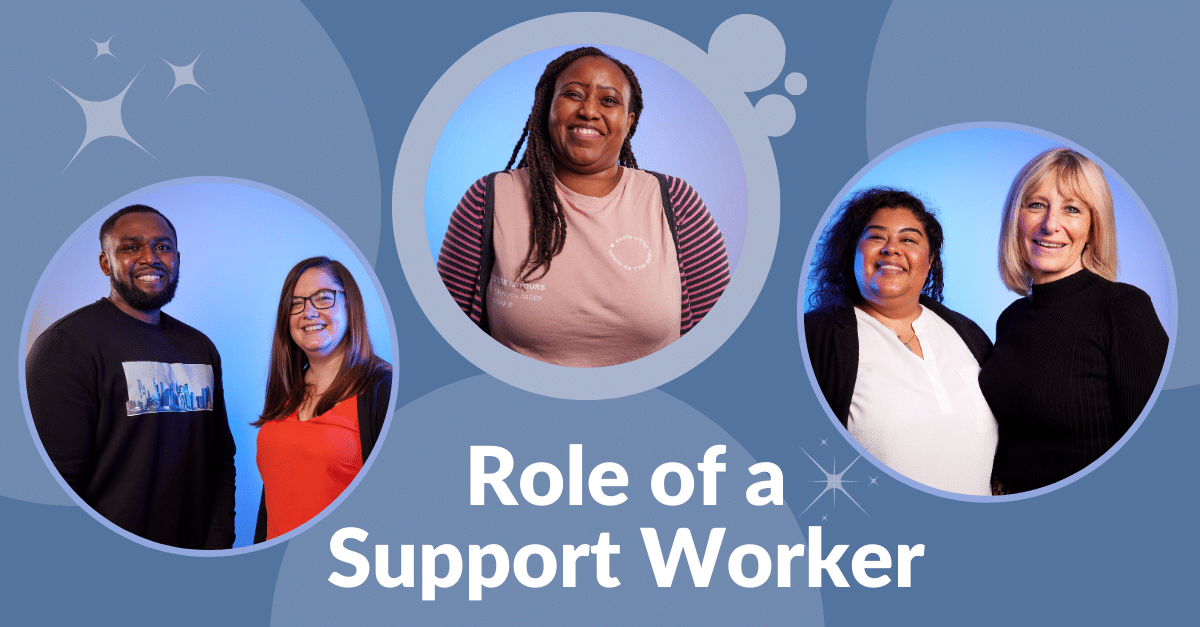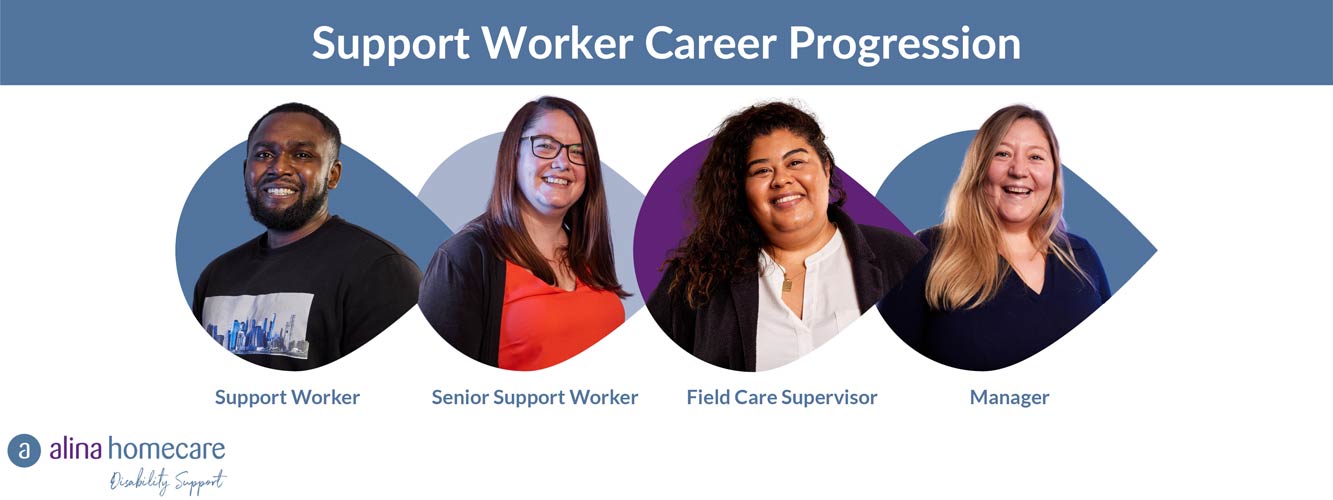There are few jobs as rewarding as being a Support Worker. The role of a Support Worker involves helping people with disabilities to lead fulfilling lives and achieve their goals.
You’ll get to make a real impact on people’s lives every day and share in their success. Read our guide on the duties and responsibilities of a Support Worker to find out more!

What is a Support Worker?
A Support Worker is someone who supports vulnerable people to help them make the most of daily life. They help service users with various physical and mental disability needs to live more independently and to achieve their goals by offering emotional and physical support.
The role of a Support Worker is hugely varied. Each service user has their own individual needs so support is tailored to each person. As a result, it’s an incredibly rewarding role where you can improve quality of life for vulnerable people and make a real positive difference to their lives.
What is support work?
Support work is all about helping service users live their best life! This means promoting dignity, independence and helping people achieve personal goals.
As a result, support work is different every day. Each person has specific needs and requirements, and we’re particularly proud that we develop individual support plans to help every service user reach their goals with our support.
What is the role of a Support Worker?
The daily role of a Support Worker changes according to the requirements of the service user they’re supporting. Sometimes the role could include helping with daily tasks like personal care and maintaining hygiene, other days it could be teaching new skills, providing emotional support and ensuring they’re living a fulfilled life.
Many of our Support Workers enjoy fun days out with our service users, from day trips to the zoo, going for a picnic, or even watching professional wrestling! Without doubt, the job can be great fun.
The role is primarily centred on supporting people to live as independently as possible. Alina Homecare Support Workers help service users with a variety of needs, from Learning Disabilities to Autism, Physical Disabilities or more Complex Care.
Support Workers often need to work in different settings; this includes Supported Living properties as well as in health and social care settings, in the community, or in the service user’s own home.
Why become a Support Worker?
Becoming a Support Worker can be a very rewarding job! Although the role can be challenging at times, making a positive difference to someone’s life and helping them achieve personal goals brings feelings of satisfaction and accomplishment. It’s ideal for someone who enjoys a varied job role and plenty of interaction with many different people!
Making new memories, celebrating accomplishments and sharing experiences together are some of the most enjoyable aspects of the role. You’ll enable people to overcome obstacles and gain confidence and self esteem to make independent life choices.
If you’d like to learn more about the role of a Support Worker before applying, check out the Skills for Care website as it has lots of useful information on how to get started. Once you feel fully informed, don’t forget to come back to apply at Alina Homecare!
If there’s a challenging day, we’re always there for each other. That’s the best part – when you’re at work, you don’t feel isolated, you’re just part of the entire family.”
Sneahaal, Support Worker at Alina Homecare
What’s included in a Support Worker job description?
A Support Worker job description will include a summary of the role and the type of candidate the recruiter is looking for, the duties and responsibilities of the role, and any necessary requirements or qualifications. It’s always important to read the job description thoroughly to understand what’s expected of you and to make sure you’d be a good fit for the role.
We’ve provided some information about the different sections of a Support Worker job description below:
Summary
A Support Worker job description will usually begin with a summary of the role and the type of candidate the company is looking for. In the case of a Support Worker, they’ll be looking for someone with great social skills as you’ll be interacting with a variety of different people.
Other areas of the summary might include a small introduction to the company and their core values, as well as a brief description of the main roles and responsibilities of Support Workers. Some Support Worker job descriptions might include information about who you’d be reporting to and the Team you’ll be working with.
A job description summary allows the candidate to easily identify whether they’d be a good fit for the role. The summary may also mention the location of where the role is based, so you don’t want to apply for a job that’s too far away!
Responsibilities
Although the summary may have mentioned some of the key responsibilities of the role, this section will go into a bit more detail. They’ll usually list a few of the most important aspects of the job so the candidate can understand what’s expected of them. This is your opportunity to understand whether the role of a Support Worker is something you’d be able to manage and if you’d be able to carry out all the duties required.
Some typical responsibilities that might be included in a Support Worker job description are:
Requirements
The requirements section of a Support Worker job description usually comes last. This may include education, previous experience or qualifications that are necessary for the role. They may also include additional skills such as IT proficiency or personality traits that are suitable for the duties of a Support Worker job role. Learn more about the different Support Worker skills you may need today.
Before applying for the role of a Support Worker, it’s important to read the requirements section to make sure you have the necessary skills and experience to be successful – you don’t want to waste your time or the time of the recruiter! This section might be split into two categories to make it easier: essential and desirable requirements.
Some Support Worker job requirements may include:

What are the responsibilities of a Support Worker?
Support Workers play a vital role in supporting people with learning and physical disabilities, mental health needs and complex care needs to live independently in the place they call home. Therefore, the role of a Support Worker is undeniably varied from day to day, especially because the people they support have unique personalities and differing needs.
Support Workers provide fundamental physical and emotional support to people so they can do the things that matter most to them. The role is focused on supporting people to live their lives as independently as possible, keeping them safe and respecting their own choices. The support they provide means people can lead full and enriching lives, helping them achieve their personal goals. This makes the job incredibly rewarding!
Support work is all about making life easier and more fun for service users. Our Support Workers plan exciting activities, from going to animal parks to learning how to cook or gardening!
At Alina Homecare, we’re passionate about treating each service user as an individual with their own hobbies and interests. The role of a Support Worker is to foster and develop these interests and help people grow in independence and confidence.
5 key duties of a Support Worker
Because there’s so much variety, it’s difficult to only include 5 key duties of a Support Worker. However, Support Worker duties and responsibilities often include:
- Personal support – helping service users with daily tasks such as personal care and hygiene, meal preparation and other domestic tasks. Support Workers also enable them to develop independent life skills, such as managing their own finances
- Effective communication – helping service users meet friends and stay in touch with loved ones. Support Workers also support those who have communication difficulties to express themselves through effective communication, using sensory stimulus where necessary
- Keeping active – supporting service users to be an active part of their local community by taking part in activities and day trips, if possible
- Emotional support – providing emotional support for service users and their families. Ensuring a safe environment for service users and encouraging them to make independent life choices. Support Workers also encourage service users to achieve short and long term goals. This could be anything from cooking a meal to attending college!
- Medication management – working with the service user and other professionals to support any medical needs, including attending appointments or administering medication, if necessary
As Support Workers progress into more senior roles, they also help manage the Team and develop individual support plans to ensure service users reach their goals.
Being a Support Worker is such an amazing role! You support people with learning disabilities with all aspects of their daily lives and engage them in exciting opportunities to enrich their lives, putting a smile on their face and yours.”
Kate Ford, Director of Alina Homecare Disability Support
What skills do you need as a Support Worker?
Support Workers need to be ready to adapt to a fast paced and varied environment. As a result, they need to be equipped with these skills:
It also helps if you have the ability to drive, so you can take our service users out for the day. At Alina Homecare, we pay a generous mileage allowance.
What qualifications does a Support Worker need?
To become a Support Worker at Alina Homecare, you don’t need any qualifications! You’ll just need to pass enhanced background checks and have the right to work in the UK.
When starting the role, you’ll receive exclusive training with our Alina Homecare Academy. This covers everything from understanding our quality standards to specific instructions so you can thrive while delivering all aspects of support work.
Once you start, there’s also the opportunity to pursue ongoing training such as an NVQ Level 2 in Health & Social Care and diplomas in the health and social care sector. Additionally, we offer social care apprenticeship opportunities so you can learn and earn at the same time.
Some Support Workers and Senior Support Workers also receive training on more specialist support work, such as administering medication and delivering Complex Care.
What makes a good Support Worker?
We understand applying for a new job can be nerve-racking, but in the social care sector, it’s not necessarily about knowing all the right skills, but having the right mindset and enthusiastic attitude. If you’re willing to work hard and make a difference to people’s lives, you’ll succeed!”
Nicol Daunt, Recruitment Manager at Alina Homecare
A day in the life of a Support Worker
There’s no such thing as a typical day in the life of a Support Worker because every day is different! Our service users are all unique individuals with different needs and interests. That means no two days are the same! A large part of what Support Workers get involved with is driven by the people they support, helping them to live with as much independence and choice as possible.
However, here is what a day in the life of a Support Worker could look like:
They might start their morning shift by helping service users get out of bed and ready for the day. The morning routine might include assisting with personal care and hygiene, as well as helping them dress. Support might be in the form of verbal prompts or direct physical assistance, depending on the person’s needs.
They’ll then support with making breakfast and discussing the plans for the day. If a service user needs medication, they’ll assist with this or remind them to take medication with their morning meal.
After breakfast, the events of the day depend on the needs of the service user and their schedule. The day could involve going to college, a shopping trip, attending an appointment, an outdoor walk or taking part in an activity. The day may be filled with different people needing different types of support.
Lunch is an important part of everyone’s day and for a Support Worker this may be eaten inside the home of a service user or out and about in the local community. It’s important to make sure wherever they are, it’s a safe and comfortable environment for the service user.
In the evenings, they’ll prepare meals or support service users with preparing their own meals. Each person will have a different night time routine. For instance, some may like to enjoy quiet time on their own before going to bed, whereas others might like to spend time together until they want to go to bed.
As well as providing both physical and emotional support to service users throughout the day, it’s equally important for Support Workers to complete necessary paperwork or admin to report on the day’s activities. This can be daily records about what has happened during their shift, or to report any information that other Support Workers, family members or other involved professionals may need to know about.
Is a Support Worker the same as a Care Assistant?
The role of a Support Worker and the role of a Care Assistant have some similarities but there are also considerable differences.
The main difference between the role of a Support Worker and a Care Assistant is the people they support. A Support Worker primarily works with people with learning disabilities, supporting them to live as independently as possible and to achieve personal goals. A Care Assistant, on the other hand, often refers to providing care to the elderly, someone recovering from surgery, or anyone who needs extra support in their daily routines. This may be through providing personal care, domestic duties or companionship.
A Support Worker’s job role is to empower people with disabilities to have more control over their lives by giving them the right support, opportunities and encouragement to live a more fulfilling life. For example, a Support Worker may support children with disabilities in their transition into adulthood, or they may work with adults with disabilities, giving them life skills and confidence to live a rewarding and full life.
Although the role of a Support Worker and Care Assistant are different, they’re both just as rewarding!
What are the different types of Support Workers and how do their roles differ?
There are different types of Support Worker job roles available. Scroll across below to learn more about these roles and their key differences.
What is the average salary of a Support Worker?
According to Total Jobs, the average Support Worker earns £19,000 a year. At Alina Homecare, we’re proud that most of our Support Workers earn more than this. Your specific salary will vary from region to region, as well as the hours and contract you choose. To find out more, we suggest chatting to our Recruitment Team.
What opportunities are there for career progression?
Many members of our Team have developed and grown their careers with us. For example, our Director of Alina Homecare Disability Support, Kate Ford, started out as a Support Worker!
We offer all employees the chance to work towards an apprenticeship, NVQ or diploma whilst working. This can lead to a Senior Support Worker role, as well as a Field Care Supervisor job or, eventually, a managerial position.
There are also chances for regular training, such as first aid, to help our Support Workers keep up with the latest developments and quality standards expected in this role.

How to apply for a Support Worker job role
If you’d like to apply for a Support Worker job role at Alina Homecare, apply now or visit our Disability Support Worker jobs page to learn more. We have many new and exciting opportunities available, so we suggest chatting with our Jobs Team to discuss your options.
You can also download our Support Worker CV template to get started. If you’re invited for an interview, read our sample Support Worker interview questions and answers with a free downloadable PDF.
Apply below to become a Support Worker with us!



